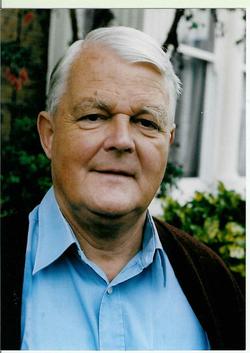
Speaking Personally: Bruce Kent
Bruce Kent
Bruce is a Vice-President of Pax Christi. He has been active in work for peace and justice since the late 1950’s, including as Chaplain to Pax Christi, General Secretary of CND, Chair of War on Want. He was instrumental in setting up the Campaign Against the Arms Trade. One of his more recent initiatives is Movement for the Abolition of War. This Spring he undertook the ‘Time to Scrap Trident’ speaking tour.
Where does your commitment to justice and peace comes from?
I’m not sure. I was brought up in a fairly comfortable middle class family and my parents were always generous when it came to appeals. I had no idea that there were people in London with outdoor shared toilets. When we needed a doctor we just rang up and asked him to call. And he did. My three years at University and six years in the seminary taught me more about charity but not much about justice. I was at school in 1945 when the United Nations Charter was signed and don’t think I ever heard it mentioned. Much later, my unexpected trip to Biafra during the civil war, showed me how cynical international politics could be as Britain sold weapons while people starved. Working in Calcutta as refugees flowed out from East Pakistan made me think about causes not just symptoms. So did my association with War On Want – always radical and convincing. Peace, I then began to understand, had to be based on Justice. The church document which really reinforced these views was Our World and You – the report of the International Synod of Bishops in 1971. ‘The Gospel has the power to set us free from sin and from what sin has done to our society.’
What for you are the most important areas of concern today
Here I think ‘for you’ is the key phrase. All issues of justice interconnect. I get fed up with people who tell me ‘you ought to put your efforts instead into this issue rather than that.’ The real problem is that so few people, even in churches, are engaged in any social change movement. Apathy and political impotence are major problems today. My own focus is on ending war, the elimination of nuclear weapons, and building the culture of peace. But the field of justice is a very large one.I see myself as being in partnership with those who are working against racism, to eliminate cruelty to animals, for decent housing, for a safe environment, for a less violent media——the list is endless. I always take a copy of the Housmans Peace Directory with me to public meetings to show people the many organisations both international and in this country through which people are trying to change the world.
What sustains you in your commitment?
Partly I suppose my genes.… My father was obstinate and I am too. I usually refuse to give up when faced by problems. When it comes to social change I’m for tortoises rather than hares. It is those who persist who often make changes. One of my convictions is that we ought to learn from the history of those campaigners who have gone before us. We all build on their efforts as others will build on ours. Another factor is that spending $1.7 trillion on war and weapons just seems to me to be so stupid and makes me angry. ‘A theft from the poor’ President Eisenhower once said.
And my faith is also a strong motivation. I think this is God’s world. While we are here our job is to work to bring that Kingdom into reality. One of the most important factors in keeping me going is the sense of family support I get from fellow minded campaigners especially from my friends in Pax Christi both here and abroad.
What are your hopes for a Church like ours for the 21st Century?
Since Francis became Pope I have become much more optimistic. Yes, the Church has been in mess often enough in the past. Feet of clay – that’s all of us. It’s only just under 200years since the Pope of the day Pius IX was calling onCatholics to send armed forces to defend the Papal St the belief that such political structures were essential to the spreading of the Gospel.But the life of the Church is not in what happens or does not happen at top level but what goes on at the grass roots in ordinary parishes. I think we are going to become more of a team church and a less priestly one. Bishops are going to have to listen more than they speak and much more before they issue instructions. I think too that we will come to recognise more generously the spirit of Christ in other Christian communities. Perhaps we will begin to concentrate more thanwe do now on the wonders of this world and their creator ratherthan on Church order, discipline and forms of worship. A‘justice and peace’ Church? I certainly hope so.‘The world is charged with the grandeur of God’ wrote Gerard Manley Hopkins the Jesuit poet. When we come to see God in everything we will be better able to encourage people to understand that they too are loved, wanted and have a purpose in life.




One thought on “Speaking Personally: Bruce Kent”
Comments are closed.